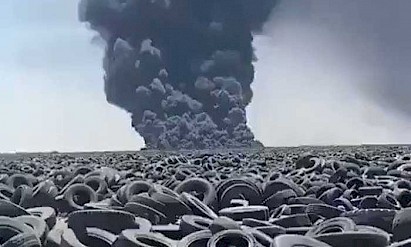UK Tyre Exports Under Scrutiny New Regulations Crackdown on Illegal Pyrolysis.

The Tyre Recovery Association (TRA) welcomes the Environment Agency’s statement of responsibilities when it comes to the shipment of used tyre exports. In a clarification, issued to T8 operators on the 03 September, the Environment Agency explicitly state that any waste export must be accompanied by a fully completed Annex VII.
In recent years, lax enforcement of the proper export paperwork has allowed a culture of irresponsibility to develop. Following the campaign led by TRA and responsible operators, the Environment Agency’s clarification states any inspection of an Annex VII must include the required information on all parties in the chain of custody. If the waste shipment does not end up being recovered at the stated consignee address the parties in the chain of custody face prosecution. The penalty can be the cost of repatriation of that illegal waste shipment, unlimited fines and up to 2 years in prison. The parties in the chain of custody include the waste generator, the broker, the consignee in the receiving country and the shipping line.
Recent evidence has exposed the UK is a primary source of fuel for unregulated pyrolysis plants in India. The authorities in India have made clear their intention to clamp down on the practice of legitimate import licences for material recovery being abused. Too often materials are ending up with non-designated operators, including the illegal diversion of imported tyres for use in backstreet, highly pollution pyrolysis. India’s Ministry of Environment, Forest and Climate Change has now issued a statement that the import of waste tyres for pyrolysis is illegal.
The TRA advises that any business involved in exporting ELTs to India, have up to date declarations of compliance from all the parties in their chain of custody, with evidence to substantiate that declaration for each waste shipment, to mitigate their risk of prosecution.
In the case of shipping operators, the TRA want to ensure they are aware of the real risk to them of being caught out. Shipping operators who have acted in good faith and delivered apparently legitimate baled end-of-life tyres (ELTs) will now have to cover the costs of shipping the waste back to the UK if the export shipment does not end up being recovered at the stated consignee address.
Peter Taylor OBE, Secretary General of the TRA, said: “The TRA want shipping operators to be aware of this significant development in the export of wate. We advise all businesses involved in exporting ELTs to India, have up to date declarations of compliance from all the parties in their chain of custody. This is especially important for the shipping companies who will find any revenues made on shipping the waste export undermined if the consignment goes on to fall foul of the rules. “For too long officials have failed to properly implement some of the most important regulations that enable business while protecting the global environment. Clarification and the solid statement of intent from the Environment Agency is very welcome. Given the statement from India’s Ministry of Environment, Forest and Climate Change that the use of imported waste tyres in pyrolysis is illegal, it is very timely. It would be foolhardy for any party in the chain of custody not to sit up and review their part of the operation. Recent evidence shows the level of abuse and it is right there are consequences for those not working to bring it to an end.”
Clearpoint Recycling fully backs the efforts of the Tyre Recovery Association and supports responsible processors in the industry. Our commitment to sustainable waste management aligns with the TRA’s mission to promote ethical and environmentally sound practices in the tyre recycling sector. By working together, we can ensure that used tyres are processed responsibly and contribute to a cleaner and more sustainable future.
Clearpoint Recycling believes that adopting the regime of pre-informed consent would help to reduce the risk of materials being responsibly exported being diverted to irresponsible processors. Pre-informed consent involves obtaining explicit permission from the receiving country before exporting waste materials. This would provide a stronger guarantee that the materials will be processed in a responsible manner, reducing the likelihood of illegal diversion.
